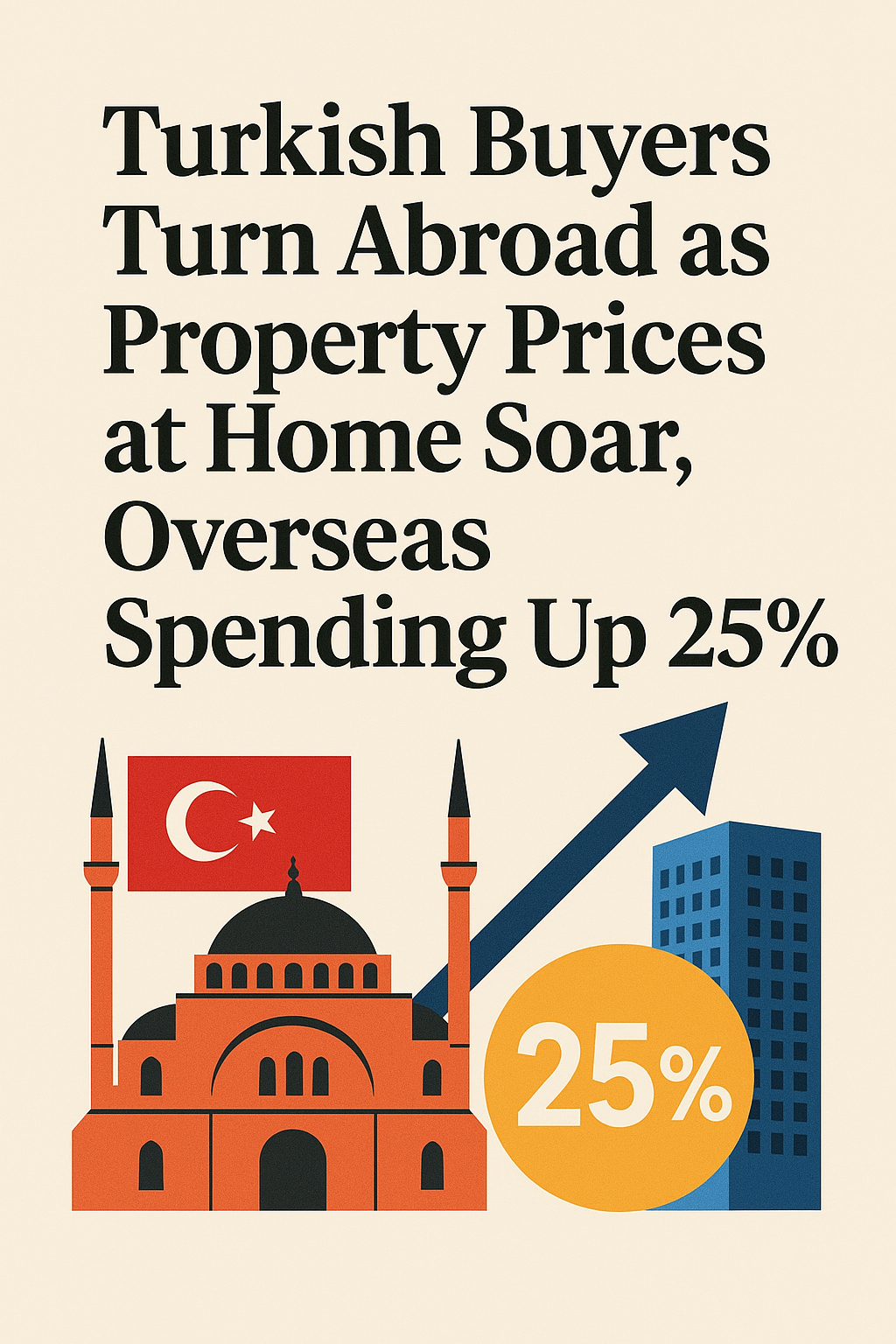Why Turkish Investors Are Turning to Overseas Real Estate in 2025
Meta Description: Turkish citizens are increasingly directing their real estate investments abroad, with overseas property purchases surpassing $1.49 billion in the first seven months of 2025, representing a 24.5% increase compared with the same period a year earlier.
A Shift in Investment Priorities
The dynamics of Türkiye’s property market are changing rapidly in 2025. For the first time in years, Turkish investors are channeling more money abroad than foreign buyers are spending inside the country. Between January and July, overseas real estate purchases by Turkish residents exceeded $1.49 billion, marking a 24.5% rise compared to the previous year. On an annualized basis, these investments reached $2.48 billion by July, outpacing the $2.16 billion spent by foreigners in Türkiye, creating what experts now call the nation’s “real estate deficit.”
This shift is more than just numbers—it’s a reflection of how rising prices, tight credit conditions, and tax burdens are reshaping investor decisions.
Loan Restrictions Push Capital Abroad
One of the strongest forces behind this trend is the difficulty of securing housing loans in Türkiye.
-
First-time buyers can borrow up to 80% of a property’s value.
-
Second-home buyers, however, face stricter rules, with borrowing limits dropping to 20–25% and interest rates climbing significantly.
While these restrictions aim to prioritize primary housing needs, they also limit investment-driven demand at home. Combined with soaring property prices, high interest rates, and stagnating household income, even genuine homebuyers are finding it harder to enter the domestic market—pushing wealthier investors to explore international opportunities.
Tax Advantages Abroad
Another factor fueling this outward flow of capital is taxation. In Türkiye, property-related taxes, deed fees, and associated costs are often higher than in competing markets. By contrast, countries such as the United Arab Emirates, Greece, Cyprus, Malta, and Monaco provide tax-friendly environments, making them attractive destinations for Turkish investors.
Looking ahead, new tax regulations planned for 2026 could intensify this trend, encouraging even more capital to move abroad in search of lower costs and greater profitability.
Citizenship and Residency Incentives
Beyond financial considerations, many Turkish investors are motivated by mobility and lifestyle benefits.
-
Golden Visa programs in Europe have become especially popular. For instance:
-
Greece offers residency for property purchases starting at €250,000.
-
Spain and Portugal provide residency pathways for investments beginning at €500,000.
-
For Turkish businesspeople and high-net-worth individuals, these schemes are not only investments but also strategic moves to gain global access and secure a second base abroad.
Meanwhile, Türkiye’s own citizenship-by-investment program, requiring a minimum $400,000 purchase, has become less appealing to foreigners. House sales to non-residents have plummeted—falling to 21,790 annually as of August 2025, a staggering 67.7% drop from the 2022 peak.
Risks Investors Should Consider
Despite the appeal, experts caution that international property investment is not without risks:
-
Rental yields abroad can be limited.
-
High insurance, service charges, and maintenance costs eat into profits.
-
Legal disputes and regulatory complexities may add uncertainty.
-
Natural disaster risks in certain destinations must be carefully assessed.
Smart investors are advised to conduct due diligence, work with reputable agencies, and balance short-term benefits against long-term risks.
Outlook for the Coming Year
If current momentum continues, Turkish citizens’ overseas property investments could reach $3 billion by the end of 2025. This would mark a historic milestone, reshaping the country’s role in the global real estate market.
As local affordability challenges persist and international incentives remain attractive, it seems likely that more Turkish investors will continue to look beyond national borders—not just for financial returns, but for lifestyle, mobility, and tax efficiency.





Join The Discussion